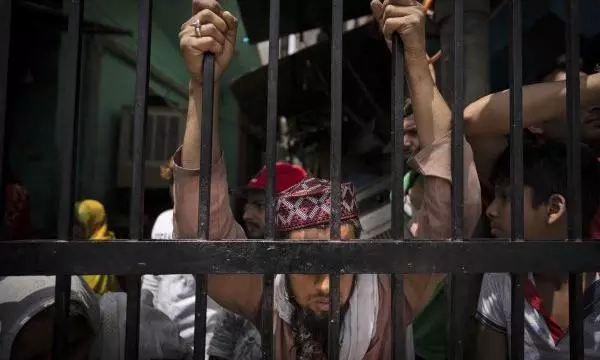
Modi urges Muslims to introspect: Here they are under ten years of his rule
text_fieldsBacklash, condemnation, and calls for action against invoking religion during the poll campaign all seemed futile and fell on deaf ears at the Election Commission, but Prime Minister Narendra Modi continued and consorted with anti-Muslim rhetoric. Innumerable incidents of spewing hate targeting the Muslim community, however, have been the BJP’s strategic utterances for the Election Commission.
Despite PM Modi’s hate speech, at one point he tried to appear neutral during a national television interview, where he blamed the Congress for the backwardness of the Muslim community and vehemently urged them to introspect.
He might have alluded to the Congress party’s inaction in taking a stand to introduce and implement schemes to improve the dire conditions of the Muslim community, despite being in power for a long time since independence. Additionally, there lurked a threat that unless the Muslim community shifts its allegiance towards the BJP and complies with its policies, their persecution and living conditions would remain dire as long as the saffron party remains in power.
The BJP came to power ten years ago, raising religiously stoked slogans. A decade later, the situation remains unchanged, as these slogans still reverberate in their poll campaigns. Prime Minister Modi's iconic yet camouflaged slogan, 'sabka saath sabka vikas,' which literally means 'with all and for the development of all,' has, however, been observed during his ten years in governance to primarily benefit a select few corporates, turning it into 'with all those' and for the development of only those.
Since Modi's ascent to power, India has witnessed a disturbing surge in communal violence and targeted attacks against Muslims, evoking questions about the sincerity of his pledge for inclusive development under the banner of "sabka saath sabka vikas" (together with all, development for all). The promise of unity and progress appears increasingly hollow against the stark reality of systemic discrimination and violence.
The narrative of intolerance finds its roots in the tragic lynching of 28-year-old Mohsin Sheikh in Pune, marking the onset of a series of hate-fuelled atrocities against Muslims. Despite the harrowing nature of these incidents, Modi's response has often been characterized by silence, raising doubts about his commitment to protecting the rights and safety of minorities.
The judiciary's acquittal of individuals involved in such heinous crimes, with remarks citing the victim's religion as a mitigating factor, further underscores the erosion of justice and accountability in Modi's India. The narrative of impunity emboldens perpetrators and instils a sense of vulnerability among Muslim communities nationwide.
The implementation of laws ostensibly aimed at protecting cows has provided a smokescreen for targeted attacks on Muslims, with a staggering 97% of cow-related hate crimes occurring under Modi's tenure. The rhetoric of ‘love jihad’ perpetuates the demonization of Muslim men and reinforces the climate of fear and suspicion.
The Citizenship Amendment Act (CAA), accompanied by inflammatory rhetoric from top BJP leaders, has sparked nationwide protests and renewed concerns about discriminatory policies targeting Muslims. The weaponization of laws to suppress dissent further undermines the democratic fabric of the nation and perpetuates a cycle of repression.
In Assam, the forced eviction of Bengali-speaking Muslim farmers exposes the intersection of state power and communal prejudice, resulting in displacement and destitution for thousands. The selective demolition of Muslim-owned properties in various states reflects a systemic pattern of discrimination and rights violations, as highlighted by Amnesty International's recent report.
Modi's use of derogatory language and inflammatory remarks against Muslims further exacerbates tensions and reinforces stereotypes, perpetuating a climate of hostility and division. The normalization of such discourse in political rhetoric further marginalizes and stigmatizes Muslim communities, undermining their sense of belonging and security.
As Modi calls for introspection within the Muslim community, it is essential to recognize the structural barriers and systemic injustices that continue to perpetuate discrimination and violence. True progress and unity can only be achieved through genuine dialogue, inclusivity, and a commitment to upholding the rights and dignity of all citizens, regardless of religion or ethnicity.
In the face of mounting challenges, Indian Muslims are confronted with a stark choice: to confront the injustices of the past and demand accountability or to succumb to a narrative of fear and resignation. As the nation grapples with its identity and future direction, the path to reconciliation and justice lies in confronting the uncomfortable truths that define Modi's India.























